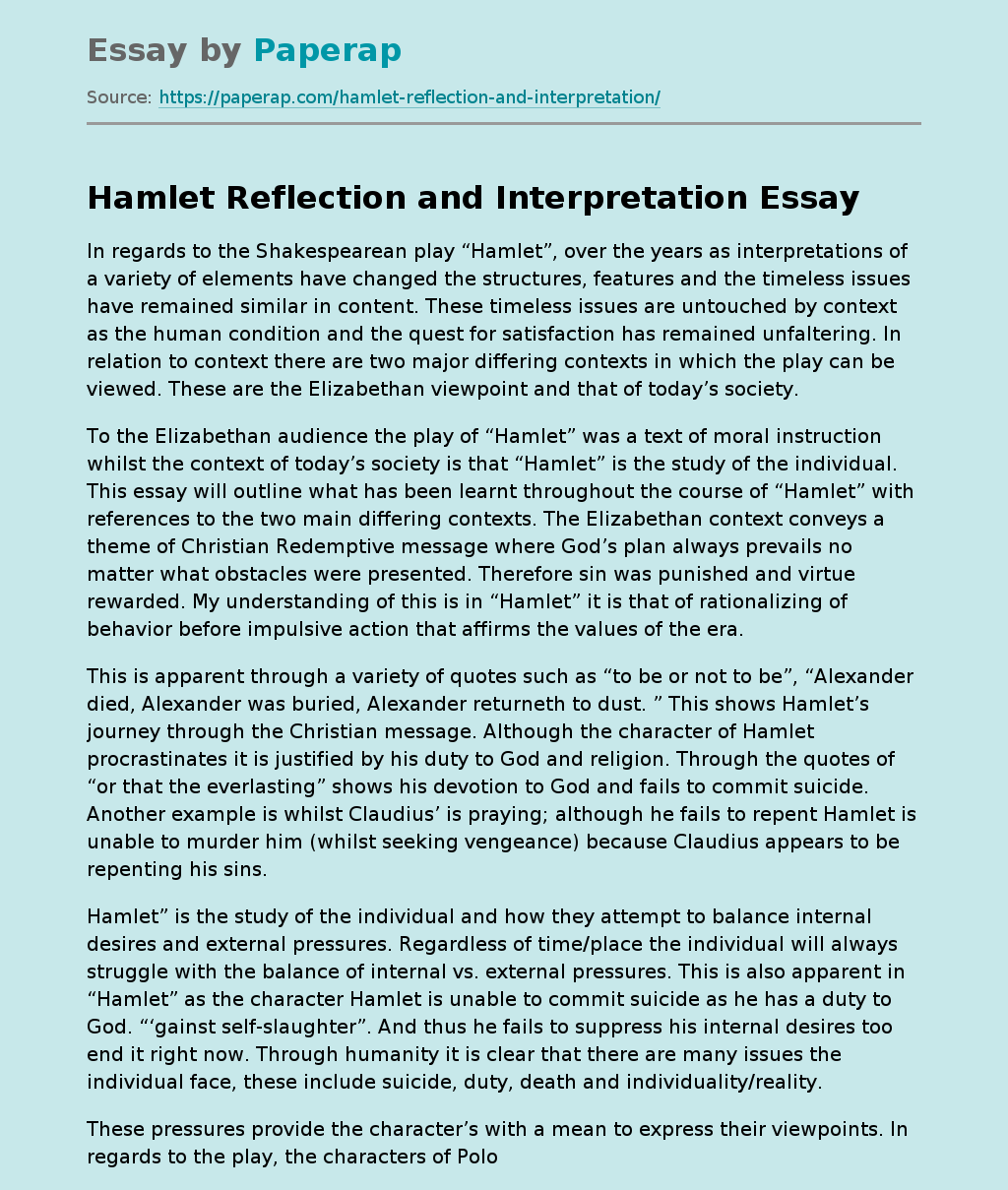Hamlet Reflection and Interpretation
In regards to the Shakespearean play “Hamlet”, over the years as interpretations of a variety of elements have changed the structures, features and the timeless issues have remained similar in content. These timeless issues are untouched by context as the human condition and the quest for satisfaction has remained unfaltering. In relation to context there are two major differing contexts in which the play can be viewed. These are the Elizabethan viewpoint and that of today’s society.
To the Elizabethan audience the play of “Hamlet” was a text of moral instruction whilst the context of today’s society is that “Hamlet” is the study of the individual.
This essay will outline what has been learnt throughout the course of “Hamlet” with references to the two main differing contexts. The Elizabethan context conveys a theme of Christian Redemptive message where God’s plan always prevails no matter what obstacles were presented. Therefore sin was punished and virtue rewarded. My understanding of this is in “Hamlet” it is that of rationalizing of behavior before impulsive action that affirms the values of the era.
This is apparent through a variety of quotes such as “to be or not to be”, “Alexander died, Alexander was buried, Alexander returneth to dust. ” This shows Hamlet’s journey through the Christian message. Although the character of Hamlet procrastinates it is justified by his duty to God and religion. Through the quotes of “or that the everlasting” shows his devotion to God and fails to commit suicide. Another example is whilst Claudius’ is praying; although he fails to repent Hamlet is unable to murder him (whilst seeking vengeance) because Claudius appears to be repenting his sins.
Hamlet” is the study of the individual and how they attempt to balance internal desires and external pressures. Regardless of time/place the individual will always struggle with the balance of internal vs. external pressures. This is also apparent in “Hamlet” as the character Hamlet is unable to commit suicide as he has a duty to God. “‘gainst self-slaughter”. And thus he fails to suppress his internal desires too end it right now. Through humanity it is clear that there are many issues the individual face, these include suicide, duty, death and individuality/reality.
These pressures provide the character’s with a mean to express their viewpoints. In regards to the play, the characters of Polonius has suppressed his internal desires and replaced it with that of external pressures. He tells everybody what they want to hear as thus enables his own desires to be satisfied in an obscure manner. The quote “very much like a whale,” shows this and enables the audience to see the contrast in his character. The play has remained relevant over the years as the elements of human nature have remained constant.
These elements include, quest for individuality, quest to understand death, quest for balance in life, pressures exerted on us both by internal and external forces. As human beings develop there is always a pursuit for satisfaction in life, the belief that there is something more to life than our selves. This is also apparent in the play “Hamlet”. When an audience member dwells upon the ideas that are present within the play, such as suicide, duty, illusion, death/heaven/hell, love, faith/religion it is clear that your personal understanding will make you question and re-think you ideas about them.
To conclude it is clear that throughout time the themes, structure and relevance of the play has remained constant. The ever-changing values of the audience have changed, shifting the ideas that they bring forth thus creating new meanings. Although the play “Hamlet” can be seen in a variety of manners it is apparent that through the exploration of the characters/themes many new understandings of things in your own day to day life such as death/duty/reality enable us to perceive them in a more in-depth manner.
Hamlet Reflection and Interpretation. (2019, Dec 05). Retrieved from https://paperap.com/hamlet-reflection-and-interpretation/

